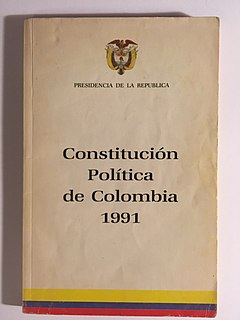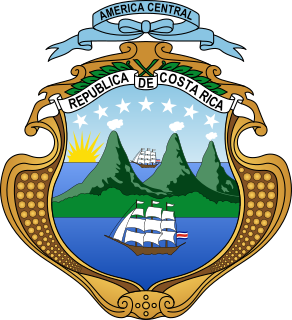Related Research Articles

The Politics of Colombia take place in a framework of a presidential representative democratic republic, whereby the President of Colombia is both head of state and head of government, and of a multi-party system. Executive power is carried out by the government. Legislative power is vested in both the government and the two chambers of congress, the Senate and the House of Representatives of Colombia. The Judiciary is independent of the executive and the legislature.

The politics of Ecuador are multi-party. The central government polity is a quadrennially elected presidential, unicameral representative democracy. The President of Ecuador is head of state and head of the army on a multi-party system, and leads a cabinet with further executive power. Legislative power is not limited to the National Assembly, as it may to a lesser degree be exercised by the executive which consists of the President convening an appointed executive cabinet. Subsequent acts of the National Assembly are supreme over Executive Orders where sufficient votes have been cast by the legislators. The judiciary is independent of the executive and the legislature. Ecuador is also considered a constitutional republic.
Separation of powers refers to the division of a state's government into branches, each with separate, independent powers and responsibilities, so that the powers of one branch are not in conflict with those of the other branches. The typical division is into three branches: a legislature, an executive, and a judiciary, which is the trias politica model. It can be contrasted with the fusion of powers in parliamentary and semi-presidential systems, where the executive and legislative branches overlap.

The Government of Colombia is a republic with separation of powers into executive, judicial and legislative branches. Its legislature has a congress, its judiciary has a supreme court, and its executive branch has a president.

Venezuela is a federal presidential republic. The chief executive is the President of Venezuela who is both head of state and head of government. Executive power is exercised by the President. Legislative power is vested in the National Assembly.

The New Hampshire Supreme Court is the supreme court of the U. S. state of New Hampshire and sole appellate court of the state. The Supreme Court is seated in the state capital, Concord. The Court is composed of a Chief Justice and four Associate Justices appointed by the Governor and Executive Council to serve during "good behavior" until retirement or the age of seventy. The senior member of the Court is able to specially assign lower-court judges, as well as retired justices, to fill vacancies on the Court.

The Congress of the Republic of Colombia is the name given to Colombia's bicameral national legislature.

The Political Constitution of Colombia of 1991, is the Magna Carta of the Republic of Colombia. It was promulgated in Constitutional Gazette number 114 on Thursday, July 4, 1991, and is also known as the Constitution of Human Rights. It replaced the Political Constitution of 1886 and was issued during the presidency of the liberal César Gaviria, with ideas from the also liberal Luis Carlos Galán.

The Government of Pakistan abbreviated as GoP, is a federal government established by the Constitution of Pakistan as a constituted governing authority of the four provinces, two autonomous territories, and one federal territory of a parliamentary democratic republic, constitutionally called the Islamic Republic of Pakistan.

The supreme court is the highest court within the hierarchy of courts in many legal jurisdictions. Other descriptions for such courts include court of last resort, apex court, and highcourt of appeal. Broadly speaking, the decisions of a supreme court are not subject to further review by any other court. Supreme courts typically function primarily as appellate courts, hearing appeals from decisions of lower trial courts, or from intermediate-level appellate courts.

The Judiciary of Ghana comprises the Superior Courts of Judicature, established under the 1992 Constitution, and the Inferior Courts, established by Parliament. The hierarchy of courts derives largely from British juridical forms. The courts have jurisdiction over all civil and criminal matters.

The Supreme Court of Justice of Colombia in Bogotá is the highest judicial body in civil and penal matters and issues of criminal and civil procedure in Colombia. The Supreme Court of Colombia is the highest authority in regard to the interpretation of administrative law, constitutional law, and the administration of the judiciary.

The judiciary of Colombia is a branch of the State of Colombia that interprets and applies the laws of Colombia, to ensure equal justice under law, and to provide a mechanism for dispute resolution. The judiciary comprises a hierarchical system of courts presided over by judges, magistrates and other adjudicators.
Sangguniang Panlalawigan, commonly known as the Provincial Board, are the legislatures in Philippine provinces. They are the legislative branch of the province and their powers and responsibilities are defined by the Local Government Code of 1991. Along with the provincial governor, the executive branch of the province, they form the province's government.

The Supreme Court of Costa Rica is the court of greater hierarchy of Law and Justice in Costa Rica.
The Federal government of Mexico is the national government of the United Mexican States, the central government established by its constitution to share sovereignty over the republic with the governments of the 31 individual Mexican states, and to represent such governments before international bodies such as the United Nations. The Mexican federal government has three branches: executive, legislative, and judicial and functions per the Constitution of the United Mexican States, as enacted in 1917, and as amended. The executive power is exercised by the executive branch, which is headed by the president and his Cabinet, which, together, are independent of the legislature. Legislative power is vested upon the Congress of the Union, a bicameral legislature comprising the Senate and the Chamber of Deputies. Judicial power is exercised by the judiciary, consisting of the Supreme Court of Justice of the Nation, the Council of the Federal Judiciary, and the collegiate, unitary, and district courts.
Jorge Aurelio Noguera Cotes is a Colombian lawyer, former Director of the Administrative Department of Security (DAS), the intelligence service agency of Colombia and a polemical convicted murderer who served during the direct orders of the president Álvaro Uribe Vélez. A Liberal party politician, he served as regional campaign manager in the Department of Magdalena for then-candidate Álvaro Uribe Vélez during the 2002 presidential elections. After Uribe's victory in the elections, Noguera was appointed Director of the DAS, serving from 2002 to 2005, after which time he was appointed Consul-General if Colombia in Milan in 2006.

The Autonomous University of Baja California is a public institution of higher education in the Mexican state of Baja California. UABC is one of the 43 state universities throughout Mexico as part of the country's state university system. Its headquarters are located in the city of Mexicali.

The President of the Supreme Court and also President of the General Council of the Judiciary of Spain is the highest judicial authority of the Kingdom of Spain and holds the representation of the judicial branch and its governing body, the CGPJ. The office of President of the Supreme Court is foreseen in the Constitution as well as giving to the president the presidency of the General Council of the Judiciary. As a parliamentary monarchy, the President of the Supreme Court is appointed by the Monarch after being nominated by the Plenary of the General Council of the Judiciary, who serves until the end of its 5-years-term, its dismissal by the GCJ or its resignation.

The National Board of Justice, formerly the National Council of the Magistrature, is an autonomous constitutional institution that is part of the Republic of Peru. Its primary function is to appoint and ratify all judges and prosecutors in the Peruvian justice system as well as to remove those that fail to fulfill their responsibilities.
References
- 1 2 (in Spanish) Judicial Branch of Colombia: Functions of the Superior Council of Judicature Archived 2010-07-10 at the Wayback Machine ramajudicial.gov.vo Accessed 17 September 2007.